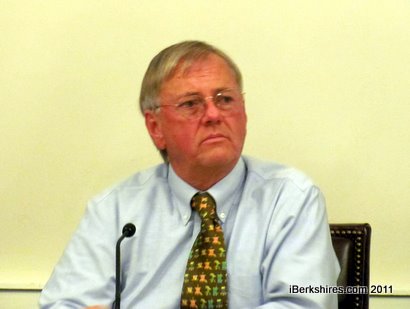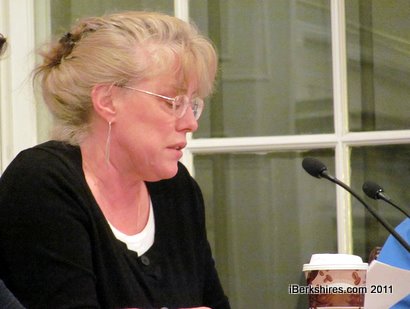Adams Selectmen Nix Meals Tax, Set Rail Trail Warrant
 Chairman Michael Ouellette argued for sending a meals tax to town meeting but thought a 2 percent rooms tax could wait until the glen was done. |
"We could send this to town meeting to decide but we're elected to take a position," said Selectman Scott Nichols, arguing against what would have been Article 3 on the warrant for April 26 special town meeting. Selectwoman Paula Melville echoed his argument stating: "The buck stops here."
The meals tax was offered as a "municipal tool" two years as a way for municipalities to offset lost state aid. The tax would add less than a penny on a dollar spent in a restuarant or pub, or 75 cents on a $100 bill.
The tax was estimated to bring in $68,800 a year. Chairman Michael Ouellette said it was an opportunity to offset the property taxes. "I don't think 75 cents on a $100 is going to dissuade anybody." His colleagues, however, objected that the tax would target local residents; what little property tax relief it offered would be added to their dinner bills.
"The people who eat here, live here," argued George Haddad, a former selectmen and longtime restaurateur and bar owner. The tax would be problematic for eateries and there was no guarantee the state, which collects the fee, would return it promptly.
If the people want the tax they could petition for it, said Selectman Arthur "Skip" Harrington. "Tax, tax, tax all the time's not the best avenue."
"I have to trust in government – we're the government," said Ouellette. But Selectman Jason Hnatonko objected that "they trust us to make the right decision."
The article was rejected with only Ouellete and, at the last minute, Melville voting in favor. Melville in the past has preferred to send issues to town meeting or the voters.
A rooms tax found the opposite support, and was placed on the warrant by a 3-2 vote. Hnatonko and Harrington, who had just spoken against the meals tax, argued for a rooms tax set at 2 percent. "Because it's not a tax on the people of Adams," said Hnatonko. "It's a tax on the people who visit."
The state Department of Revenue did not have enough data to calculate the revenue but Selectmen expect that the buildout at the Greylock Glen will spark more lodging.
The actual reason for the special town meeting — the approval of eight easements related to the extension of the Ashuwillticook Rail Trail to Lime Street and the use of Chapter 90 funds to reconstruct a retaining wall on Enterprise Street — was swiftly placed on the warrant.
Melville was concerned that not all of the paperwork for the eight easements had been signed; Harrington said all the property owners were agreeable to the endeavor and speculated the delay was because agreements had to be reviewed by their attorneys.
Harrington continued that the abuttors had real concerns about the trail, particularly in the industrial park because of vandalism. "The people who use the rail trail are pretty nice people," he said, and may actually aid in reducing the bad element.
The board also came to a consensus on giving MJD Real Estate two more weeks come into compliance on the truck depot it operates out of the former Curtis Fine Papers mill on Route 8. The company had fallen behind on installment payments on back taxes prompting the town to rescind permitting and abatement. MJD is fighting to keep the agreement and a technical issue caused the Zoning Board to make a second attempt next week at rescinding its permit.
 Selectwoman Paula Melville asked for her colleagues' correspondence. |
Melville argued strongly against another chance. "They went eight months doing anything despite efforts to reach out to them." Nichols was concerned that it was unclear what they were being asked to approve and felt he didn't have enough information — especially since there were several figures being lobbed around that the company supposedly owed.
The board came to a consensus that the Zoning Board would be asked to hold off on a decision and Dubendorf would be invited in two weeks to explain to the board what the company's plan was.
The ongoing drama between Melville and her colleagues surfaced at the end of the meeting when she handed them written requests for emails and other recorded correspondence between them and the town administrator. Melville filed a complaint of open meeting violation with the district attorney's office over an emergency meeting held over conversations about the budget she had with bargaining unit members.
The board then went into executive session "to consider the discipline or dismissal of, or to hear complaints or charges brought against, a public officer, employee, staff member, or individual." It became obvious the subject of the session was Melville when she said she would not stay to be "humiliated." Ouellette asked if she wanted the session to be open and informed the audience that Melville had been fully informed of her rights.
Melville, however, left the building. Ouellette said no vote would be taken once the board came out of executive session.















